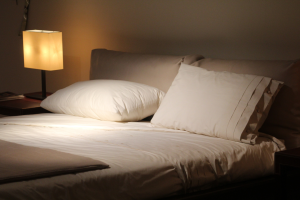5 Big Benefits of Sleep and How to Sleep Better
Why is sleep important? 24 hours without it can make the brain age up to two years. Catching ZZZs is more than a time to rest - it’s essential for our health. Scroll to learn more about the benefits of sleep.

Taglines
Words
Zara Kenyon
Never feel guilty for having a lie in again. Studies show sleep is one of the best things you can do for your health, and lack of it can lead to all sorts of health issues: from high blood pressure to low immunity.
So if you’re not getting your recommended 7-9 hours, here’s why sleep should be one of your health priorities for mental and physical wellbeing. Let’s unpack the many benefits of sleep…
The Benefits of Sleep
1. Boosts Energy
While in a deep sleep, the body goes into repair mode - removing toxins, repairing cells and enhancing adenosine triphosphate (ATP). This is a molecule in the body that gives energy to cells, supporting essential daily functions like muscle contraction. More energy for cells means more energy for the entire body, so think of sleep like putting yourself on recharge.
2. Supports Immunity
Studies suggest during sleep, the immune system releases more cytokines (proteins that control inflammation in the body) and T-cells (white blood cells). They both work with the body's immune response to fight infection and inflammation, which is why not getting 7-9 hours can make us more susceptible to illness, like seasonal colds.
3. Improves Heart Health
One of the key benefits of sleep: the heart can take a much-needed rest, as both the heart rate and blood pressure drop. When sleep is disrupted or cut short, the body’s parasympathetic nervous system (the nerves that activate ‘fight or flight’ mode) stay on high alert overnight. This means the cardiovascular system can’t get the restorative rest it needs.
4. Supports Concentration
We’ve all felt the effects of a bad night’s sleep, like brain fog and lack of focus. This happens because neurons in the brain have been working overtime with no rest, causing slower reaction times and feeling distracted. Long-term effects from lack of sleep can even lead to memory loss and cognitive decline, so it’s important to prioritise a good rest.
5. Reduces Stress
Not getting enough sleep can spike cortisol levels (the stress hormone) in the body. Less sleep increases inflammation and stimulates the parasympathetic nervous system, both of which lead to higher levels of cortisol in the body. During good quality sleep, cortisol naturally lowers, enabling the body to quietly carry out its rest and repair processes uninterrupted.

Tips to Improve Sleep Quality
It’s not just about the amount of hours you sleep. The quality of sleep is just as important. Here’s how to reap the benefits of sleep for optimal rest.
Start a Sleep Schedule
If you struggle to drift off or get up in the morning, going to bed and waking up at similar times daily creates a natural sleep schedule the body can get used to. For a little help, take two berry-flavoured Sleep Wellness Gummies one hour before bed. Vitamin B6, Zinc and Lemon Balm will work their magic, so you feel the full benefits of sleep. Dreamy.
Avoid Nap Temptation
If you find you need 40 winks between calls when working from home, keep them to 20 minutes max. Any longer and you could be disrupting your sleep-wake cycle, making it harder to get to sleep that night. To feel revived during the midday energy slump, light Power Up Energising Candle at your desk and let notes of Lime, Patchouli and Cardamom fill the room.
Sip Herbal Tea
Avoid stimulants like alcohol, caffeine and nicotine at least a few hours before bed. They wake up the brain when you’re trying to wind down, making it harder to switch off floating thoughts. Instead, swap for caffeine-free peppermint tea (great for digestion) and add a few drops of CBD Night-Time Oil (which is also peppermint flavoured) as part of your nightly routine.
Have a Hot Bath
Sinking into a bath is a dream self-care ritual for many of us, and it’s also a known remedy to help you sleep. Being immersed in hot water lowers the body’s core temperature, sending a signal that it’s time to rest. Elevate the relaxation with Bath Melt CBD Bath Bomb, featuring muscle-soothing Epsom Salts and the calming scent of Santal, Amber and Musk.
Dim the Lights
Light suppresses melatonin (the sleep hormone) production and stimulates brain activity, making us feel less tired. Try low level, soft lighting in the bedroom to prepare the body for sleep. Light Power Down Relaxing Candle on your nightstand to fill the room with soothing scent notes as you cosy up with a book. (Just don’t forget to blow it out before you drift off.)
Get Your Daily Dose of Sunshine
Daily exposure to sunlight regulates the body’s internal clock, known as the circadian rhythm. This supports the sleep-wake cycle, so the body knows to feel sleepy when it’s dark and awake when it’s light. To help feel more awake in the mornings, try getting outside in natural light for a few minutes to suppress melatonin production and wake up the brain.
Avoid Heavy Meals Before Bed
The digestive system slows down before we go to bed. This means heavy meals can take longer to digest, leaving the gut feeling full and uncomfortable while lying in bed. It can also disrupt our sleep, as the body works harder to process the food and nutrients during this rest and repair time. To achieve the benefits of sleep, eat at least 2-3 hours before bed.




































































